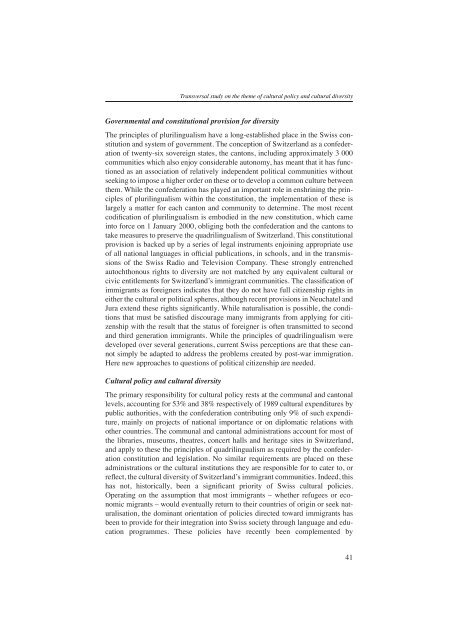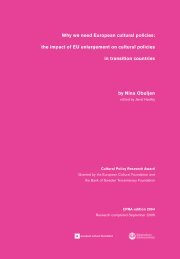Tony Bennett, Differing diversities - Council of Europe
Tony Bennett, Differing diversities - Council of Europe
Tony Bennett, Differing diversities - Council of Europe
Create successful ePaper yourself
Turn your PDF publications into a flip-book with our unique Google optimized e-Paper software.
Transversal study on the theme <strong>of</strong> cultural policy and cultural diversityGovernmental and constitutional provision for diversityThe principles <strong>of</strong> plurilingualism have a long-established place in the Swiss constitutionand system <strong>of</strong> government. The conception <strong>of</strong> Switzerland as a confederation<strong>of</strong> twenty-six sovereign states, the cantons, including approximately 3 000communities which also enjoy considerable autonomy, has meant that it has functionedas an association <strong>of</strong> relatively independent political communities withoutseeking to impose a higher order on these or to develop a common culture betweenthem. While the confederation has played an important role in enshrining the principles<strong>of</strong> plurilingualism within the constitution, the implementation <strong>of</strong> these islargely a matter for each canton and community to determine. The most recentcodification <strong>of</strong> plurilingualism is embodied in the new constitution, which cameinto force on 1 January 2000, obliging both the confederation and the cantons totake measures to preserve the quadrilingualism <strong>of</strong> Switzerland. This constitutionalprovision is backed up by a series <strong>of</strong> legal instruments enjoining appropriate use<strong>of</strong> all national languages in <strong>of</strong>ficial publications, in schools, and in the transmissions<strong>of</strong> the Swiss Radio and Television Company. These strongly entrenchedautochthonous rights to diversity are not matched by any equivalent cultural orcivic entitlements for Switzerland’s immigrant communities. The classification <strong>of</strong>immigrants as foreigners indicates that they do not have full citizenship rights ineither the cultural or political spheres, although recent provisions in Neuchatel andJura extend these rights significantly. While naturalisation is possible, the conditionsthat must be satisfied discourage many immigrants from applying for citizenshipwith the result that the status <strong>of</strong> foreigner is <strong>of</strong>ten transmitted to secondand third generation immigrants. While the principles <strong>of</strong> quadrilingualism weredeveloped over several generations, current Swiss perceptions are that these cannotsimply be adapted to address the problems created by post-war immigration.Here new approaches to questions <strong>of</strong> political citizenship are needed.Cultural policy and cultural diversityThe primary responsibility for cultural policy rests at the communal and cantonallevels, accounting for 53% and 38% respectively <strong>of</strong> 1989 cultural expenditures bypublic authorities, with the confederation contributing only 9% <strong>of</strong> such expenditure,mainly on projects <strong>of</strong> national importance or on diplomatic relations withother countries. The communal and cantonal administrations account for most <strong>of</strong>the libraries, museums, theatres, concert halls and heritage sites in Switzerland,and apply to these the principles <strong>of</strong> quadrilingualism as required by the confederationconstitution and legislation. No similar requirements are placed on theseadministrations or the cultural institutions they are responsible for to cater to, orreflect, the cultural diversity <strong>of</strong> Switzerland’s immigrant communities. Indeed, thishas not, historically, been a significant priority <strong>of</strong> Swiss cultural policies.Operating on the assumption that most immigrants – whether refugees or economicmigrants – would eventually return to their countries <strong>of</strong> origin or seek naturalisation,the dominant orientation <strong>of</strong> policies directed toward immigrants hasbeen to provide for their integration into Swiss society through language and educationprogrammes. These policies have recently been complemented by41














